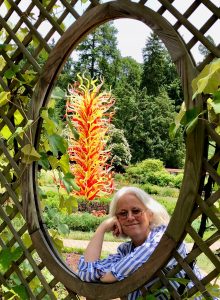Published on October 17, 2018
Tell us a little about yourself.

My name is Alison Lee. I live in the forested mountains of Western North Carolina.
How did you hear about GrassrootsHealth & vitamin D?
For years, I have followed Dr. Mercola and it was through his interview with Carole Baggerly in 2009 that I first learned about the D*action breast cancer prevention project as well as the possible connection between D levels and cancer.
Why are you part of the Breast Cancer Prevention Project?
I am keenly interested in both preventative and alternative health. While I first joined the study because I was curious to know my own D levels, I have continued to participate because I realize the importance of the research. Since I believe my participation contributes to valuable data being gathered, I intend to participate as long as possible.
How was your health before using vitamin D?
My health has always been pretty good. Prior to the study, I would generally get one cold/year. Now that I am a participant, I monitor my D levels to make sure they stay consistently within a healthy range. Since beginning the study, I no longer have annual colds.
How much vitamin D do you get? How do you get it (sun or supplements)?
I rely on supplements to make sure I maintain my D levels. For myself, I generally find that 8,000 – 10,000 units/day keeps my range between 70 and 80 ng/ml (175 – 200 nmol/L). Of course, it would be ideal to rely on the sun, but I am not able to have adequate skin exposure each day with the sun above the 50 degree azimuth; and at 62, my body is probably not assimilating as efficiently as it used to.
What is your vitamin D level? How often do you test? Any tips or stories?
 My last D level test result was 84 ng/ml (210 nmol/L). Currently, I test twice a year and have had 17 tests. The result of my first test was 27 ng/ml (67 nmol/L). That initial level surprised me as I tested myself after having spent two weeks in Vero Beach, Florida, where I was out sunning every day. After that test, I began supplementing regularly. Over the years I have and continue to experiment with supplements and dosages. The supplement may be gel, powder or sublingual and the dosage is generally between 8,000 – 10,000 IU/day, though sometimes, especially when traveling, I forget to take my supplements. Realizing how important maintaining higher D levels is, I particularly appreciate the feedback that bi-annual testing provides.
My last D level test result was 84 ng/ml (210 nmol/L). Currently, I test twice a year and have had 17 tests. The result of my first test was 27 ng/ml (67 nmol/L). That initial level surprised me as I tested myself after having spent two weeks in Vero Beach, Florida, where I was out sunning every day. After that test, I began supplementing regularly. Over the years I have and continue to experiment with supplements and dosages. The supplement may be gel, powder or sublingual and the dosage is generally between 8,000 – 10,000 IU/day, though sometimes, especially when traveling, I forget to take my supplements. Realizing how important maintaining higher D levels is, I particularly appreciate the feedback that bi-annual testing provides.
One thing that I have discovered is that when I do forget to take my supplements or slack off a bit, I can be more vulnerable to catching colds. I think I even had the flu a couple of years ago. In each case, I responded by taking a larger dose of D for 3 days—50,000 IU/day. The larger dose of D seems to have a dramatic effect on boosting my immune system. Whatever I have caught, or am catching, gets knocked out.
Another thing that I have noticed since beginning supplementation is that I no longer need to go to the dentist twice a year. I used to go to the dentist twice a year and during my visits, the gum measurements usually had one, two or three “4’s” with all others in the 1-3 range. I no longer have any 4’s. Now, all of my measurements are mostly 1’s and 2’s with a few 3’s. The only changes that I made were Vitamin D supplementation and a change in toothpaste. I believe that one of these changes or both of them together may be responsible or at least played a role in the improvement of my dental health.
What do you recommend to others?
What I have experienced with my own health, even though I was already pretty healthy, has convinced me of the importance of maintaining and monitoring D levels on a regular basis. Because of this, I have become something of a Vitamin D evangelist. The research that I have read indicates that it is simply too important to ignore. My best recommendation to others is to have your D level checked, supplement to increase your levels (I, the layperson, recommend 60-80 ng/ml) and get in the D*action study so you can contribute to the valuable research being done.
 Do you believe vitamin D helps fight breast cancer? If yes, what convinced you? What do you tell other women about vitamin D?
Do you believe vitamin D helps fight breast cancer? If yes, what convinced you? What do you tell other women about vitamin D?
I am not fully informed on the research but yes, I do believe that vitamin D helps fight and also prevent not only breast cancer but many other types of cancer as well. The graphs produced by the study were particularly convincing. Early on, I recall seeing one that looked like a 45-degree drop in the breast cancer rate as D levels increased. For me, that was particularly compelling. So, I often tell people about this chart. I also tell them that the rate of diabetes drops significantly as D levels increase. Awhile back one presentation suggested that increasing D level from 21 to 48 ng/ml reduced the incidence of diabetes something like 80 to 90% (Note from GrassrootsHealth – 60% lower incidence rate at 41 compared to 22 ng/ml).
I cite these studies, forward people web links to Grassroots as well as links to interviews with Carole on YouTube and I encourage them to read up and get in the study.

 Do you believe vitamin D helps fight breast cancer? If yes, what convinced you? What do you tell other women about vitamin D?
Do you believe vitamin D helps fight breast cancer? If yes, what convinced you? What do you tell other women about vitamin D?